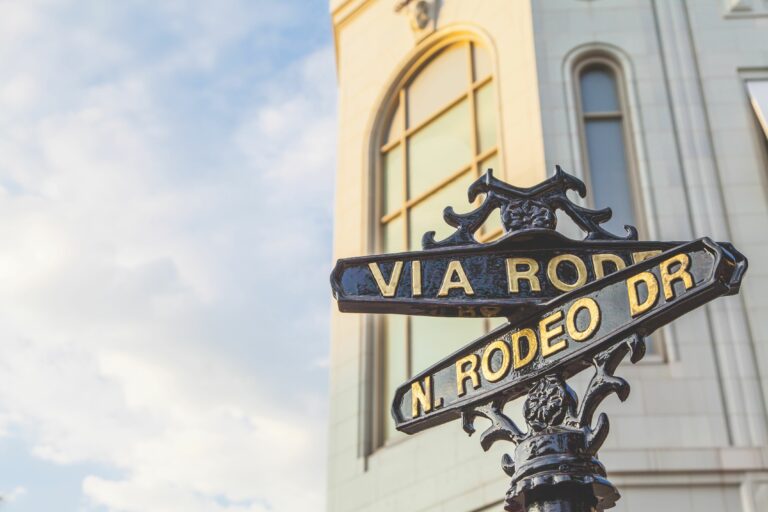
Despite receiving approval by the city, LVMH Moët Hennessy Louis Vuitton’s planned hotel for Rodeo Drive has been shot down by voters in a special election, a move experts agree could have long-term effects for Rodeo Drive.
“It’s one of the stupidest businesses decisions of a city I’ve ever heard of,” Jay Luchs, a vice chair at Newmark Group Inc. and a broker who represented LVMH on its acquisition of properties on the iconic street, said. “I don’t think anyone, including LVMH, ever expected to be shut down.”
He clarified that while the city had technically approved the project, its residents voted against it. The vote tally was narrow—51% voted against the project.
Luchs added that the street has now gone from having “nothing available as there was a frenzy to find space and now there is potentially 150,000 square feet of frontage.”
The ultra-luxury LVMH hotel, dubbed Cheval Blanc Beverly Hills, had been approved by the city last year. It was rejected by a slim number of votes in a special election held in May. The hotel was expected to have 115 rooms, street-level retail space, a spa and other amenities.
Jessica Miller, a LVMH spokesperson, said in a statement the hotel would “respect the outcome, and will not bring the hotel project back in any form.”
Carine Mamann, an executive director at brokerage Cushman & Wakefield, called the vote a “huge loss for the city.”
“It would have created more jobs, revenue for the city and brought more foot traffic, especially for the 400 block, and brought more tourism and more life to the city,” she said.
The hotel was expected to generate nearly $800 million for the city over the next 30 years. Opposition was led by Unite Here Local 11.
LVMH had spent millions assembling parcels of land on Rodeo Drive where the hotel was expected to sit. The biggest transaction came in 2018, when LVMH purchased a former Brooks Brothers store for $245 million. The company also has a large number of stores on Rodeo Drive, and in 2021 purchased the Luxe Hotel Beverly Hills for $200 million.
LVMH is owned by Bernard Arnault, the richest man in the world.
Mike Rielly, managing director of Beverly Hills-based Rielly Retail Solutions, said that projects “get snubbed all the time” so the hotel being shot down isn’t unheard of.
“This isn’t necessarily anything new. The fact that it happened to the richest man in the world is,” Rielly said. “That’s why everybody is taken aback by it.”
400 block
Prior to LVMH purchasing a number of buildings on the 400 block of Rodeo Drive, Luchs said it was difficult to find tenants for the block, which is not as busy as the 200 or 300 block of Rodeo Drive.
That changed, he said, when the hotel was announced.
“Other brands wanted to be near it and everyone in town was talking about it as if it was going to be the greatest thing that ever happened on Rodeo Drive,” he said, adding that it would have been a “traffic driver.”
Mamann agreed that tenants wanted to be near the hotel.
“Having a hotel across from a retail store or on the same block would have been huge,” she said. “The hotel would have just been the icing on the cake and such an amazing addition to the street.”
Not having the hotel, Luchs said, “sets us back five years to the time when it was hard to lease the northern part of the 400 block” and made the block “less valuable and less interesting to other brands.”
“It leaves a dead zone where people thought there would be traffic created,” he added.
Still, experts agree that Rodeo Drive, especially the 200 and 300 blocks, is still in high demand and a place high-end retailers want to be.
New opportunities
Luchs said there could be room for as many as six tenants where the hotel would have gone. He said it was too soon to know what LVMH would do with the properties and how difficult leasing the area could become.
Chris Maling, a principal with Avison Young, added that tenants want to be closer to Wilshire Boulevard, but Rodeo Drive as a whole was still viewed favorably.
“It’s an internationally known brand street and high street retail. For the aggregate crowd, they don’t distinguish placement on Rodeo as a ranking by address. Locally there may be some, but at the end of the day it’s supply and demand and if you want to be on Rodeo Drive you don’t really have many options and there’s a barrier to entry. If you build a quality project, people will come.”
He did not think the lack of a hotel would have a huge impact, and added that some retailers may even use the hotel projects’ failure as “an opportunity due to barriers of entry to get access to Rodeo Drive.”
Maling said the property may also become attractive to a developer looking to do high-end residential units above ground-floor retail. He said multi-level retail was unlikely for the area.
Rielly agreed that residential could go into the area.
“Office is still hard hit … and retail for the most part is being cautious with how they develop,” he said.
Mamann said Rodeo Drive would, despite the rejection of the hotel, “continue to be the hottest street in Los Angeles, the best street in Los Angeles” and expects to see more demand.
